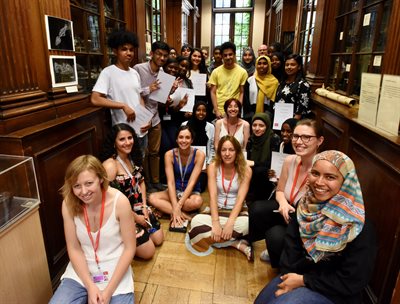Successful Immunology & Microbial Sciences Summer School
19 students spent two weeks in the School of Immunology & Microbial Sciences shadowing researchers, receiving essential employment skills training and creating their own podcasts as part of an inaugural Summer School.
In collaboration with the charity in2science and sponsorship from King’s Health Partners Widening Participation committee, school students were hosted at the School of Immunology & Microbial Sciences and paired with researchers to shadow in their labs.
In2science is a charity who empower students from disadvantaged backgrounds to achieve their potential and progress to STEM and research careers through high-quality work placements and careers guidance.
The Summer School, led by Dr Monica Agromayor, concluded on Friday 27 July with a celebration event in the Museum of Life Sciences for students and staff to celebrate a successful fortnight of experiments, workshops and training sessions.

The students also received a series of career talks from people who used their science degrees in different ways to the traditional research route. For example, Melanie Wulff, Senior Editor, The Lancet Neurology and Amy Crouch, Managing Associate, Intellectual Property at Simmons & Simmons.
One student, Rita, commented:
‘I hadn’t done a lot of hands-on science before’. The scientist she shadowed, Jack, demonstrated an inflammation response and how anti-inflammation cells interact with one another. From this, Rita is now ‘considering studying biomedical science’.
As part of their coursework, the students were required to prepare a podcast about their experiences. These are currently being edited and will be available to listen to shortly.
Speaking about the summer School Dr Agromayor said:
‘I’ve been involved with In2science since 2014 but, until now, I’ve always hosted one student on my own. Having a large group come at once has been challenging and a lot of work but also an enriching and fun experience. I’ve liked the sense of community it has created in the labs - everybody I've spoken to felt part of something important and exciting and was very supportive and attentive to the students. We were all very impressed with the level of knowledge and commitment the students had and I personally have enjoyed speaking to them about past education experiences, different science degrees and careers and projects we currently have ongoing in the lab. It was very nice to see the students relaxed in the final day celebration and telling us how much they had enjoyed the experience. I think everybody in the school should feel very proud!’
The summer school was organised and led by Dr Monica Agromayor and coordinated by post-doctoral researchers Darja Pollpeter and Elizabeth Allan and PhD student Thomas Maguire.